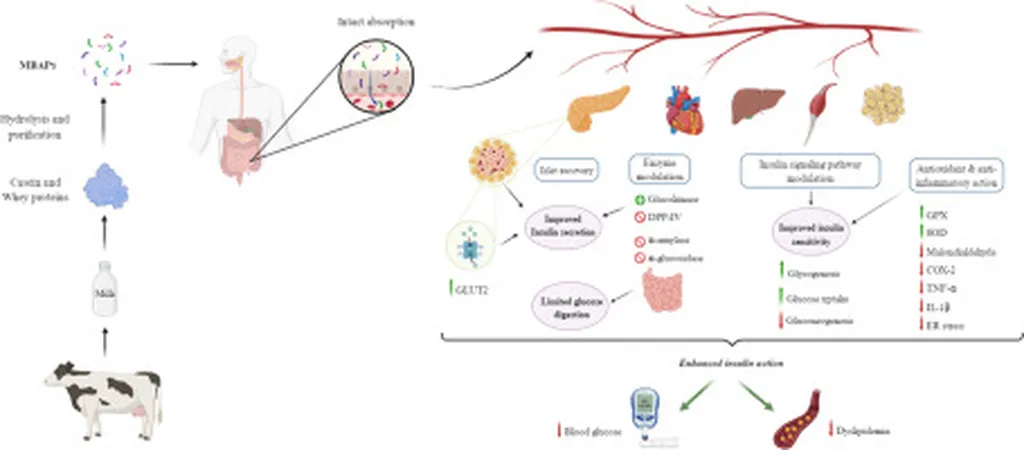In a groundbreaking study published in *Academia Nutrition and Dietetics*, researchers have uncovered the potential of goat milk-derived bioactive peptides to combat type 2 diabetes mellitus. The study, led by Anu Rahal from the Division of Animal Health at the Institute of Indian Council of Agricultural Research-Central Institute for Research on Goats (ICAR-CIRG) in Mathura, India, highlights the promising role of these peptides in managing glucose levels through their interaction with key enzymes and proteins involved in glucose metabolism.
The research team conducted an in silico assessment to evaluate the binding affinity of goat milk peptides with four critical targets: α-amylase, α-glucosidase, 5′-adenosine monophosphate-activated protein kinase (AMPK), and dipeptidyl peptidase-4 (DPP4). These enzymes and proteins play pivotal roles in glucose metabolism and transport. The study identified several peptides, including aLA3, aLA4, bc6, bLG1, bLG2, kas3, and kcas5, which demonstrated excellent binding statistics, including low binding energy and hydrogen bond interactions, with all four targets.
“These peptides showed remarkable binding affinity, which suggests they could potentially inhibit the activity of α-amylase and α-glucosidase, thereby slowing down carbohydrate digestion and absorption,” Rahal explained. “Additionally, their interaction with AMPK and DPP4 indicates a potential to enhance glucose uptake and utilization in the body, which is crucial for managing type 2 diabetes.”
The findings suggest that the availability of these goat milk peptides could provide a synergistic effect, acting at multiple receptor sites to maintain optimal glucose levels in diabetic patients without the side effects often associated with conventional treatments. This could pave the way for the development of novel nutraceuticals derived from goat milk, offering a natural and effective approach to managing diabetes.
The commercial implications for the agriculture sector are significant. Goat farming is already a vital component of many agricultural economies, particularly in regions where small-scale farming is prevalent. The identification of these bioactive peptides could add substantial value to goat milk production, creating new market opportunities for farmers and processors. This could lead to increased demand for goat milk and its derivatives, thereby boosting the agricultural economy.
Moreover, the study opens avenues for further research into the potential health benefits of goat milk and its components. As Rahal noted, “This research is just the beginning. There is a vast array of bioactive peptides in goat milk that we have yet to explore. Understanding their mechanisms and potential applications could revolutionize the way we approach diabetes management and other metabolic disorders.”
The study’s findings were published in *Academia Nutrition and Dietetics*, with Anu Rahal as the lead author. The research not only underscores the importance of goat milk in human nutrition but also highlights the potential for innovative agricultural practices to address global health challenges. As the world grapples with the rising prevalence of type 2 diabetes, the discovery of these bioactive peptides offers a ray of hope, demonstrating the power of scientific research to transform traditional agricultural products into cutting-edge health solutions.

